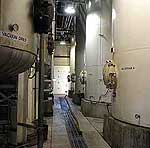By Cara Hetland
Minnesota Public Radio
February 12, 2002
Your postal carrier likely drives a truck run on a fuel called biodiesel. It's an alternative fuel used by many vehicle fleets. The soybean oil additive is said to help engines run cleaner. It's better for the environment, and could boost the price of soybeans. The use of biodiesel has tripled in the last four years, but it still accounts for a tiny fraction of the fuel used in this country. Less than one percent of all soybean oil is used for biodiesel. It will likely take federal subsidies and mandates to help the biodiesel industry become more competitive and more affordable.
| |
|
|
|
||
Semi-trucks line up outside the Ag Processors soybean crushing plant. They dump soybeans into underground storage, as a rail car pulls alongside - ready for its next load.
The Ag Processors plant in Sergeant Bluffs, Iowa, is one of a very few soybean crushing plants that also makes biodiesel. Once the beans are crushed, the meal is sold as livestock feed and the oil is processed for many uses. Nearly all of it goes to the food industry - for salad oils, cooking oils, and margarines. Less than one percent is then processed into a fuel additive.
It only takes a few rooms in this plant to make biodiesel. Plant manager John Anderson makes the process sound a little like a chemistry class. But the end result is a pure soybean oil. Sitting in a handful of storage tanks is what some hope will redefine how diesel engines run.
"Just like any other brand new product, market penetration and market awareness take time," says John Campbell, a vice president of Ag Processors. "There's two factors that are critical to the growth of the industry, one is market acceptance and one is price."
Campbell says market acceptance is coming. The sticking point is going to be the price. Biodiesel is commonly used in Europe, and its use is growing slowly in the U.S. Recently, the John Deere company announced it would support the use of biodiesel in its machinery. Campbell says statements like that are an important step.
"When you're putting a new product into a very expensive piece of equipment, you want to be sure everything is kosher," says Campbell.
| |
|
|
|
||
Biodiesel marketers are focusing on government fleets and farm equipment. The federal government requires alternative fuels for a percentage of government fleets. New York City uses a biodiesel blend in its garbage trucks. The Defense Department has biodiesel available for Navy and Air Force ground vehicles. The Postal Service uses biodiesel in its trucks. Biodiesel also fuels busses in some cities.
John Campbell says using fuel additives from soybeans isn't just good news for farmers. He says the engine burns cleaner, the smell is pleasant - something like french fries - and it's a natural byproduct with no carcinogens.
Campbell says the Environmental Protection Agency ruled recently that diesel fuel can no longer contain sulfur. He says biodiesel will benefit from this ruling. It adds what's called lubricity to an engine, lubricating the moving parts while the engine runs.
"So we believe that as low sulfur diesel is phased into the market, refiners and engine manufacturers will have to look at soy as a legitimate lubricity additive in their regular formulations," he says.
Campbell says other legislation can make a good situation even better for biodiesel. At least one recent analysis shows biodiesel will grow approximately one percent a year for the next 15 years. The study says the United States currently processes 51 million bushels of soybeans for biodiesel each year. In 15 years it'll take 318 million bushels of beans per year. The price for soybeans would increase 11 percent over that same period.
The CEO of World Energy Alternatives says the timing has never been better for biodiesel. Gene Gebolys says there's bipartisan political support to increase alternative fuels and decrease the country's dependency on foreign oil.
"We're about to have the Senate take up the energy bill, and in it we're going to figure out if there's a national will to produce domestic renewable fuels or not," says Gebolys.
| |
|
|
|
||
Gebolys says there are two key proposals that would help biodiesel. One would include biodiesel in many of the same subsidies that fossil fuels and ethanol now receive. He says without a price support structure, biodiesel would not be able to compete on a level playing field. The other proposal goes farther - it requires the use of biodiesel.
"Oil companies that currently sell gasoline and diesel would have to put in an increasing percentage of renewable content. That would create a much bigger platform for biodiesel to play in - in years to come," Gebolys says.
Ron Ness, president of the North Dakota Petroleum Council, says subsidies are all part of the game. But Ness doesn't want the government to tell him what to do.
"Consumers and customers want the choice of what they're going to buy - whether it's gasoline, diesel fuel, bread and butter, pop, beer, whatever. The consumer should have that choice and that option," says Ness. We're opposed to mandates of those products which cause distribution problems for the industry, and quite frankly, can raise the price of the product at the pump which consumers do not like."
U.S. Senate Majority Leader Tom Daschle of South Dakota says reducing dependence on foreign oil and increasing the production of alternative fuels is the key to the future.
"We need to make these fuels cost competitive, and we need to ensure that those who are willing to make the investment know that it is in the national interest," says Daschle. "It is in the national interest to help them along. I believe that nothing would do more than the creation of an alternative fuel market, and more development of alternative fuels, to rid ourselves of the dependency on foreign sources."
Daschle says the U.S. Senate will take up the energy bill in the next few weeks. He says if the biodiesel incentives and mandates don't make it through, he'll attach them to other legislation.
There are 30 kinds of gasoline already on the market. Representatives from the petroleum industry say the last thing we need is another one. Biodiesel supporters say they're not looking for separate pumps at gas stations across the country. They just want soy added to the products already sold.
More from MPRMore Information



